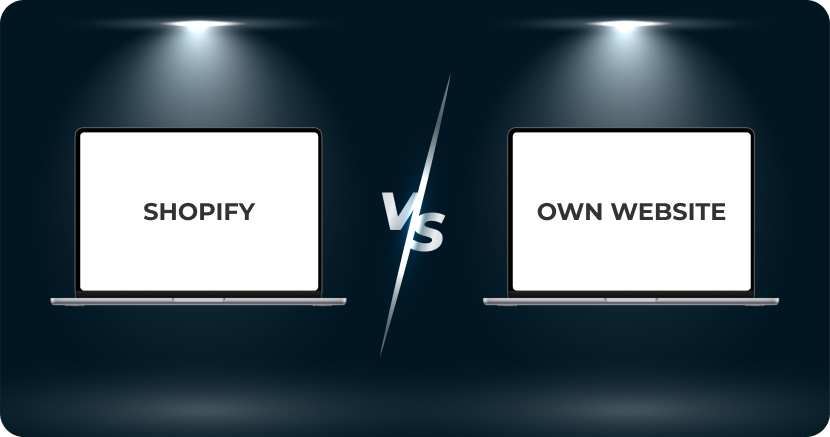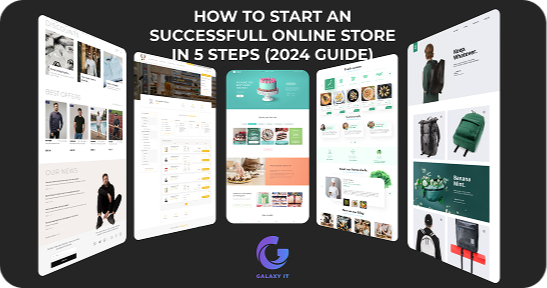Which is Better for Ecommerce: Shopify or a Custom Website?
- 18.06.2024
- 1 views
- 7 min
A common question arises:
If you're aiming to enhance your company's online presence, deciding on how to create your ecommerce website is crucial. A common question arises: "Which is superior for ecommerce: Shopify or a custom-built website?"
Interesting fact: Since its inception in 2004, Shopify has rapidly emerged as a leading ecommerce platform. The company was founded by two snowboarders who wanted to sell products online. When they couldn't find a platform that met their business requirements, they decided to create their own.
Shopify vs Own Website: Key Differences
The primary differences between Shopify and a custom website lie in their approaches to developing and managing web resources. Shopify is a cloud-based service that offers users comprehensive template solutions, enabling them to quickly launch and efficiently manage online stores without needing extensive technical knowledge. This option is ideal for those who prioritize simplicity and speed and prefer operating within well-defined parameters without aiming for deep customization.
A chart illustrating the ecommerce landscape compared to Shopify shows significant growth, establishing Shopify as a key player in the ecommerce platform sector. For instance, the sharp increase in market presence until 2021 indicates that the platform expanded greatly, with investor confidence peaking during these years.

Conversely, custom development starts from the ground up, with websites hosted on independent servers. This approach gives businesses complete control over every aspect of their web presence, including functionality, design, and security. It allows for the implementation of unique design and technical solutions tailored to specific business needs.
Custom Website vs Shopify: Ease to build a website
Shopify and custom websites cater to different needs, each offering unique advantages. For small businesses or those new to ecommerce, Shopify is an ideal choice, allowing for quick site deployment without requiring extensive technical expertise. Its user-friendly tools and flexible templates make starting an online business accessible to novices.
On the other hand, creating a custom website involves a more complex process and a deeper understanding of web development. Though this approach may seem more challenging and costly, it provides a website perfectly tailored to the specific needs of your business.
Custom websites excel in offering:
- Enhanced flexibility for integrating essential functionalities;
- Tailored optimization for distinct operational processes;
- A bespoke user experience that stands out.
How much does Shopify cost?
 A basic account on Shopify’s platform starts at $29 per month, with additional fees for every transaction using online credit cards. However, if you choose to use Shopify Payments, you won’t incur extra transaction fees. With a basic Shopify account, you can list an unlimited number of products.
A basic account on Shopify’s platform starts at $29 per month, with additional fees for every transaction using online credit cards. However, if you choose to use Shopify Payments, you won’t incur extra transaction fees. With a basic Shopify account, you can list an unlimited number of products.
Shopify offers hundreds of themes for your ecommerce website. While some themes are free, others can cost up to $180. The theme you choose will determine the look and feel of your website. Additionally, you can source themes from third-party developers and apply them to the Shopify platform.
How much does a custom website cost?
A custom website, by comparison, will cost significantly more to build, ranging from $1,000 to $10,000 or more, depending on the tools and features you require. Costs will include the design, development, and ongoing maintenance of the website. Adding functionalities such as order fulfillment, payment processing, and customer support will increase the effort and expenses involved.
Even if you opt for WordPress, making changes to a template can cost between $500 and $1,500. This "in-between" solution allows for adding features or changing the layout of a site to meet your needs. WordPress offers its own ecommerce solution called WooCommerce, which is free to use, though some features are only available with a paid account.
Shopify vs Own Website Design
Certainly, the design of a website plays a pivotal role in shaping brand perception and profoundly impacts the overall user experience.

When comparing Shopify to a custom website, each option offers distinct advantages:
- Custom websites provide unparalleled design flexibility, starting from scratch using design tools like Figma to create unique layouts. These layouts can be tailored to exact business requirements, allowing for the integration of distinctive design elements that showcase the brand's uniqueness and visually differentiate it from competitors.
- In contrast, Shopify offers a range of basic templates that users can customize. While these templates allow for some personalization, they come with inherent limitations and do not provide the same level of creative freedom as a fully custom-built site.
Opting for a custom website is ideal for those who prioritize complete control over the visual and navigational aspects of their site. However, if speed and convenience are paramount, Shopify provides a streamlined alternative with ready-made templates that can meet your needs efficiently.
Which One Is Better for You?
 The decision between Shopify and creating your own website largely depends on the specific needs, size, and growth stage of your business. Shopify is an excellent choice for startups and small businesses aiming for rapid market entry within budget constraints. On the other hand, a custom website is more advantageous for medium-sized businesses that are expanding and require specialized functionalities or a unique site that reflects their brand and caters to specific user preferences.
The decision between Shopify and creating your own website largely depends on the specific needs, size, and growth stage of your business. Shopify is an excellent choice for startups and small businesses aiming for rapid market entry within budget constraints. On the other hand, a custom website is more advantageous for medium-sized businesses that are expanding and require specialized functionalities or a unique site that reflects their brand and caters to specific user preferences.
For large corporations or businesses in niche industries needing extensive customization and control, a custom website offers capabilities beyond what Shopify provides. When deciding between Shopify and creating your own website, it's essential to align with your long-term business strategies, considering initial costs, potential for future growth, and ongoing support requirements. Selecting a platform that supports these strategic objectives is crucial for ensuring sustained business success.







